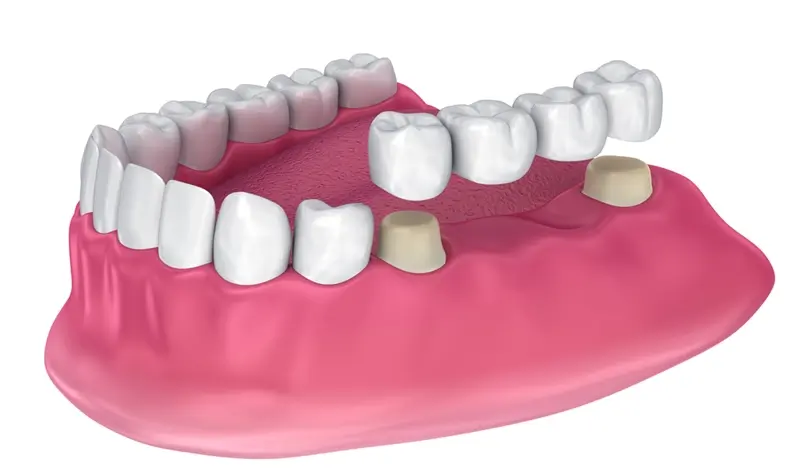Due to accidents, poor dental care or gum disease, many people are missing some of their teeth and surrounding tissue. It's important to replace missing teeth so that the surrounding teeth don't move into the space they leave and destabalise your bite. It's also important for obvious reasons like improving the appearance of your smile, and making eating easier.
The types of replacement your dentist is likely to consider are dental implants or dentures. Here we look at which option is best for you and how they're used.

Dentures
Complete or full dentures
If you've lost all your teeth for whatever reason full dentures are the best solution for you. As the name suggests, complete dentures replace all of your teeth on the upper or lower part of your mouth, or both. Usually, these are molded to closely fit the shape of your mouth and gums, so that they form a seal in order to stay in the correct position inside your mouth.
Dentures can fill the gap and have you back smiling and eating within weeks.
Partial dentures
When a few teeth are missing partial dentures or dental bridges are used to fill the gaps. Removable partial dentures usually include a gum-coloured base, and a metal framework that helps holds the replacement teeth in their correct place.
Fixed or permanent partial dentures are installed by placing artificial crowns on the teeth each side of the gap and attaching a bridge to them which holds the false teeth in place. This not only improves your appearance and ability to chew, but also helps to hold your other teeth in position, stopping them from shifting inward to fill the empty space.
Modern technology means that both partial and complete dentures closely resemble real teeth, and most people won't be able to tell the difference.
Dental implants
Dental implants consist of a metal rod screwed directly into the jaw and a titanium and porcelain crown placed on top to resemble a tooth. If this procedure is completed properly, it's very difficult to tell the difference between an implant and a real tooth.
The metal rod fixed into your gum means that implants are very stable, and can often last a lifetime. Plus they don't require any special attention – you just need to brush and floss them like your regular teeth.

What to expect
After an initial consultation your dentist will let you know what the best solution is for you. If you go for dentures then over the course of a few weeks and a number of visits your dentist will:
- Make impressions of your jaw and take measurements.
- Build model dentures in the shape of your mouth and have you try these on to check that they fit perfectly.
- Cast your denture, check it fits and make final adjustments if necessary.
Implants on the other hand should require two or three visits which involve, embedding the titanium rod into your jaw, waiting for it to fuse with the bone and finally returning to install the crown on top.
If you're missing all or some of your teeth there's no reason to stress. Dentures can fill the gap and have you back smiling and eating within weeks, with little pain and at a reasonable cost. To find out if dentures are right for you, book online today to arrange a no obligation consultation at City Dentists Wellington.
